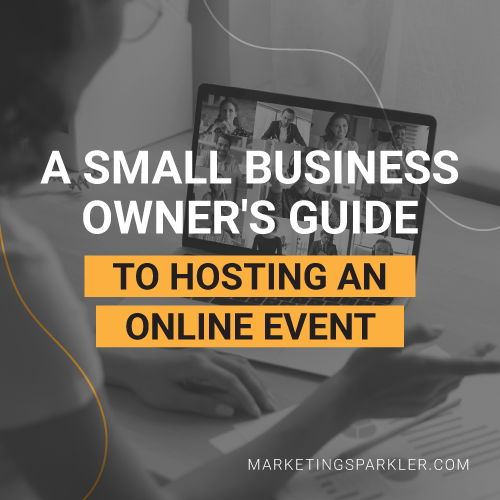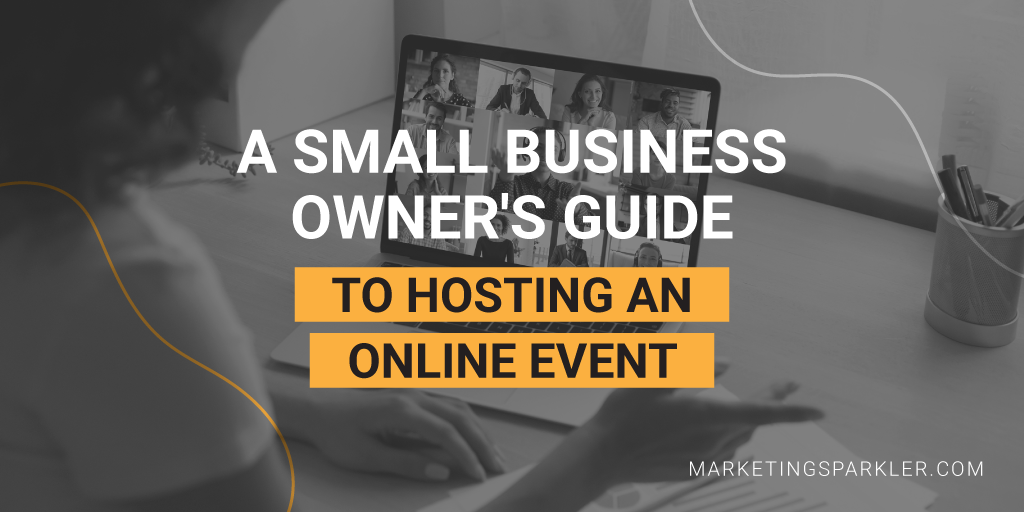Online events can boost brand awareness for your business and increase your overall reach. They’re also accessible, which could make people more willing and able to come. Here are some steps to take when hosting an internet-based gathering to raise the likelihood of its success.
A Small Business Owner’s Guide to Hosting an Online Event
Choose the Event Type
One of the first considerations for hosting an online event as a small business owner is the type. Will you offer a weekend-long conference or a one-hour expert panel? Consider your target audience and the content that’ll appeal to them the most. Thinking of your company’s purpose can also guide your decision because you can directly tie the event to brand awareness.
For example, if you’re a web designer offering an online course in site development for beginners, it’s probably not feasible to cover everything in an hour. However, if you provide art classes and want to provide an online taster, that event might fit nicely in an hour slot.
Consider your available resources and confidence about hosting an online event, too. Perhaps you’re the sole person running your business and want to hold the event within the next three months. In that case, it’s probably best to aim for a smaller option first to see how things go. From there, you can scale up for future events, provided you’re well-equipped to do it.
Define What Success Means
It’s also vital to iron out how you’ll measure success and what goals you have. Prioritizing profitability requires scrutinizing and potentially eliminating any aspect that could go over budget. Conversely, if your main goal is to make people more aware of your business, that’s another type of measurable success.
Next, determine which metrics could gauge the event’s success before, during and after it happens. For example, you might track the number of presale tickets purchased, the average number of guests attending each scheduled offering or how many times your event materials get liked and shared on social media.
Remember that some successes are not immediately evident. Perhaps someone sees your event advertised on social media and doesn’t attend it but becomes aware of your business for the first time that way. They might reach out to you months after the event happens and casually mention that a social media promotion caused them to do that.
When hosting an online event, determine which metrics could gauge the event’s success before, during and after it happens. Click To TweetMarket Your Event Appropriately
Effective promotion for your event gets people excited about it, plus gives the impression that your business is involved in compelling things. Focus on your existing network first, such as social media followers and email list subscribers. Then, branch out and raise awareness among groups that don’t know your brand yet.
If you have a business blog, it can help you spread the word, too. Consider tweaking your content plans and publishing event-specific posts. That might mean centering on some of the event’s themes and including a call to action, encouraging people to attend and learn more. Alternatively, if you’ve invited speakers, see if they’re willing to write short posts or have you interview them as part of the content strategy. Those options preview what’s to come.
Select and stick with an event hashtag, too. You can use it to provide some marketing consistency. Plus, once people decide to attend or discuss their experiences at the event, they can use the hashtag to bring more context to any relevant social media posts. A common format is to use only the event’s name as the hashtag. Another possibility is to combine the event name and year. Regardless of what you choose, keep it as simple and memorable as possible.
When marketing your online event, focus on your existing network first. Then, branch out and raise awareness among groups that don’t know your brand yet. Click To TweetImplement Interactive Elements
Many people unfamiliar with online events wonder if they merely involve sitting in front of a computer for hours. You can disprove that assumption by giving people plenty of ways to interact with event hosts and each other.
One possibility is to assign facilitators to guide small groups and larger meetings. Many people feel awkward about speaking to break the silence. However, if a facilitator asks open-ended questions or takes an informal poll, those interactions can become ice breakers that make people feel more comfortable participating.
Think about using a platform that allows for live audience surveys or questions during gatherings such as keynote speeches, too. If a presenter gets real-time feedback, they can adjust the topics they cover or provide further clarification on a previous point.
Set Expectations for Your Audience
Maybe you’re moving a previously in-person event on the internet for the first time. Alternatively, perhaps you anticipate that many target audience members have never attended online events before. In those cases, people want concrete reasons to come, and they need specific examples of how an event on the internet differs from a face-to-face one.
One way to help your online event stand out is to offer archived content. Most people have been to conferences and wished they could be in multiple places at once due to all the interesting things happening. Archived streaming content solves that problem. You can also offer it to people who can’t attend at all due to other obligations. That option raises your event revenue and adds convenience for attendees.
Clarifying things for potential attendees may mean offering digital perks, too. Many people who go to physical events get programs that help them decide what to do and where to go, but they receive them upon arrival. You could highlight how people will get digital programs immediately after purchasing their passes. That approach should give people more time to plan how to make the most of their attendance.
When organizing an online event, be sure to include interactive elements, and decide on extra digital perks that will help attendees make the most of their experience. Click To TweetMinimize Tech Troubles
Technical difficulties often accompany online events, but that shouldn’t make you think twice about holding them.
Start by getting attendees set for tech success. You can:
-
- Provide a detailed guide for accessing and navigating the event — complete with screenshots.
- Publish a list of minimum technical requirements, recommended platforms or devices and other specifics to help things go smoothly.
- Tell attendees when you’ll begin admitting people to the event and encourage them to arrive near that time rather than at the last minute.
- List a phone number, email address or live chat service people can avail of to get immediate assistance — particularly during first-time access attempts.
- Urge people to create any necessary login details before the event begins and to use a password manager to prevent forgetting them.
- Designate some event staff members as stewards and direct attendees to engage with them about tech woes or questions during the event.
It’ll also give you peace of mind to do a trial run of some event aspects before they happen. For example, if you plan to run a game for attendees or put them into breakout sessions, try doing those things beforehand. Then, you can troubleshoot any problems and reduce the chances they happen again.
Grab a friend and do a trial run of the technical aspects for your online event, to identify weak spots and minimize tech troubles before the live event. Click To TweetKeep the Momentum Going After the Event
Once your event is over, congratulate yourself for a job well done while capitalizing on opportunities for further engagement. Many people feel various positive emotions after attending online events — from empowerment to a renewed sense of purpose and connection. Help people continue enjoying those feelings by interacting with them about their experiences.
You might take a poll and ask for people’s favorite parts of the event. The feedback will prove especially helpful for shaping any future gatherings you hold. It’s also wise to send comment forms to every attendee and give them an incentive for filling them out. You might enter them in a drawing for a gift card or upcoming event ticket.
Encourage people to share their photos, meaningful quotes, lighthearted stories or anything else significant about the event. The idea is that you’ll help attendees remember all the good times while letting others know they should strongly consider signing up for any other gatherings you hold.
Learn and Grow Through Online Events
Regardless of the type or size of your online event, you’ll find that some things about it go brilliantly while others have room for improvement. Take a balanced approach as you look back on the event and plan others on the horizon.
You can learn and grow through both successes and perceived failures. Apply those experiences to other online efforts, and you’ll progressively become more educated about what works best for your goals and business.
Ciao,
Miss Kemya
This is a guest post from Eleanor Hecks, Editor-in-Chief at Designerly Magazine. Eleanor was the creative director and occasional blog writer at a prominent digital marketing agency before becoming her own boss in 2018. She lives in Philadelphia with her husband and dog, Bear.




